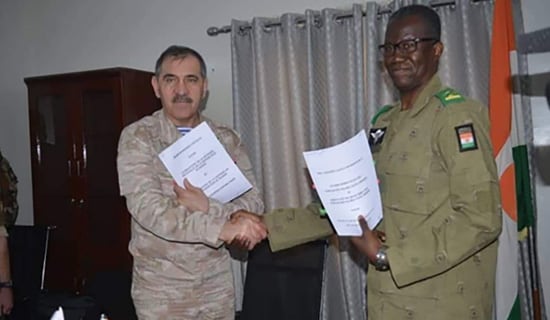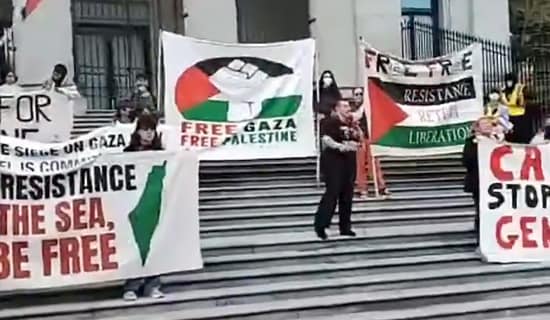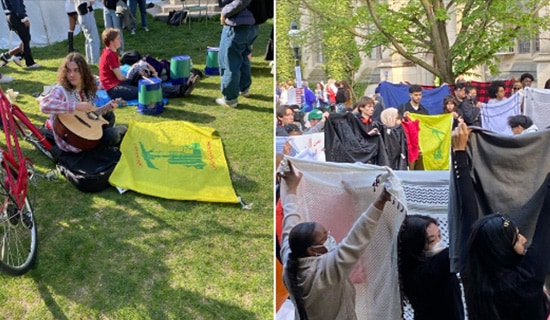On February 14, 2019, Russian President Vladimir Putin hosted another Sochi summit on the situation in Syria with his Turkish and Iranian counterparts, Recep Tayyip Erdogan and Hassan Rouhani.
Rosbalt published an interview with Russian Academy of Sciences Middle East expert Alexander Shumilin, titled "At Sochi , There Was No Full Agreement". Rosbalt journalist Alexander Zhelenin introduced the topic as follows. "Judging by everything the discussions of the presidents of Russia, Turkey and Iran… conducted at Sochi ended in failure. It is not accidental that the Russian mass media is stingy in its commentary about this meeting and the words of Putin said upon its conclusion are only of the most general nature. The announcements of both Rouhani and Erdogan attest that on one of the main issues of the current meeting in Sochi – resolving the problem of Idlib province, where now the main body of the Syrian opposition opposed to the regime of Bashar Assad, the leaders of Turkey and Iran take fundamentally different positions."
Below is the interview with Shumilin:[1]
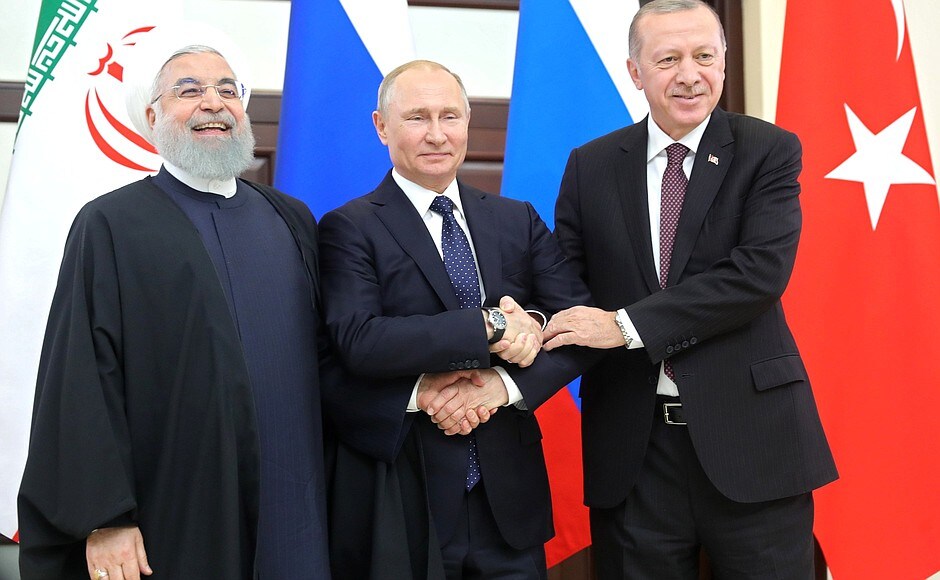
Russian President Vladimir Putin with the President of Iran Hassan Rouhani (left) and the President of Turkey Recep Tayyip Erdogan in Sochi (Kremlin.ru)
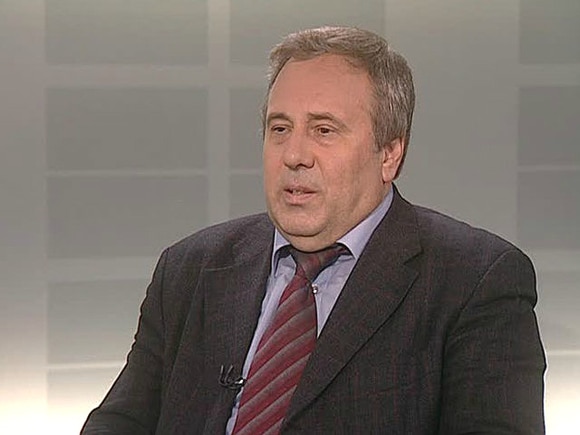
Alexander Shumilin (Source: Rosbalt.ru)
The Astana Process From The Very Beginning Was Controversial
Q: "How do your appraise the results of the discussions in Sochi?"
Shumilin: "Obviously, the problem of Idlib was at the center of discussions. Therefore, the result of these discussions was more satisfactory from the perspective of the absence of measures that could have been taken in the direction of a humanitarian catastrophe in this Syrian province. It is known that in Damascus, and also to a large degree in Tehran and Moscow, they have not removed the issue of a military operation in Idlib from the agenda. Any delay of it provides a chance for an agreed solution to this problem."
Q: "The fact that the points of view of Iran and Turkey on pacification in Syria, despite the common words of their leaders are opposed was well-known even earlier. However, for me, a passage by Rouhani about guaranteeing the rights of the Kurds in Syria was somewhat unexpected. In this connection, my question is why would the leader of Iran, where a few million Kurds also live and where the Kurdish question is likewise quite acute, express himself on this ever painful topic for both Tehran and particularly for Ankara?"
Shumilin: "Yes. The Kurdish problem for Iran is acute as it is for Turkey. The phrase used by Rouhani about the Kurds is sufficiently general and the main question is what he implied with it. Actually, he would like to evade a solution to the Kurdish problem in Syria, which later can be reproduced in Iran itself.
"Rouhani with these words can imply the same as Assad. That is in Syria, they [the Kurds] will become full-fledged citizens and receive something along the lines of cultural autonomy in the form of recognition for the Kurdish language. But autonomy in the form in which it exists for the Kurds in Iraq, they want to avoid. This position by Rouhani on the Kurds corresponds to the position of Erdogan and possibly with Putin's position on this issue.
"Although, considering that there was a period when Moscow backed the Kurds in their resistance to Turkey , for the Russian side, its position on this issue is a bit closer to the Kurdish one than to the Turkish one."
Q: "The fundamental question, so it seems to me, is what comes next after the talks in Sochi? Of course the situation around Idlib remains up in the air. But the main thing is that the parties to the Astana negotiating process have totally different positions that have absolutely not gotten closer as a result of the last meeting. And as far as concerns Turkey and Iran, the feeling created is that they unfortunately have become further apart…"
Shumilin: "A fully plausible feeling. Further on, we may have the situation preserved in its frozen condition. If an opportunity presents itself (that Moscow, Tehran and Damascus would interpret as a necessity) for the launch of a military operation with regards to Idlib, they will not fail to use it. This pressure is also on the armed groups concentrated in Idlib, and at the same time on Erdogan, as he is charged with the mission of de-radicalizing these extremist organizations.
"The Turkish leader has agreed to this mission, but is it being fulfilled? In the meantime, he's implemented there a degree of control, but the jihadist potential in Idlib has been maintained. In some sense, for the foreseeable future this is in Erdogan's hands. If he desires he can purge this zone, but it is clear that he has no such desire. Aside from this, some Islamist groups located in Idlib , are tied to Saudi Arabia.
"This of course is not ISIS and not the former Jabhat Al-Nusra (both organizations are considered terrorist and are banned on Russia's territory), but some others. And there are its arrangements with the Saudis that are to influence their groups. In general, the situation is very complicated, so that any delay of a military operation in Idlib is a compromise and a good thing."
Q: "Doesn't it seem to you that the Sochi (meaning Astana) three-way format is flawed, namely because it does not take into account the interests of other serious players? For it is taking place without the US, Saudi Arabia, Israel…"
Shumilin: "Of course. The Astana process from the very beginning was controversial, but it was the only possible one in that situation. Therefore under the very best of circumstances it lacks the potential to achieve fundamental reconciliation, but only preliminary containment. In other words, it has the potential for a truce, pacification, preempting the outbreak of hostilities, but not for a momentous solution of the problems.
"This by the way was what the former special representative of the UN Secretary-General on Syria, Staffan de Mistura said, when he emphasized that the Astana process had exhausted itself and it was necessary to move on to a settlement in Syria on the base of the UN instruments.
"But this precisely has not happened, and the chances for this in the foreseeable future are not great. At the same time any drastic step towards it could incur losses for each of the parties. Therefore everybody now prefers to preserve the situation in its frozen state, while at the same time preparing for a military operation as the generals, both in Tehran and in Moscow, are pressing for."
Appendix I - Meeting With President Of Iran Hassan Rouhani And President Of Turkey Recep Tayyip Erdogan – Kremlin.ru, February 14, 2019
"The fourth trilateral meeting of the heads of states, guarantors of the Astana process for facilitating the Syrian peace settlement has been held in Sochi.
"The agenda of talks between Vladimir Putin, President of the Islamic Republic of Iran Hassan Rouhani and President of the Turkish Republic Recep Tayyip Erdogan includes further joint steps towards a long-term settlement in the Syrian Arab Republic.
"Following the meeting, the heads of state adopted a Joint Statement and gave a news conference."
President of Russia Vladimir Putin: "Colleagues, friends, Mr Rouhani, Mr Erdogan,
"First of all, I would like to thank you for accepting our invitation and coming to the Russian city of Sochi to discuss the further actions of Russia, Iran and Turkey regarding the Syrian issue.
"Within the Astana process, which was launched two years ago, we managed to create a truly efficient mechanism of direct contacts between the Syrian government and the armed opposition. Astana and Sochi have hosted 11 meetings with the participation of Russian, Iranian and Turkish delegations, as well as Syrian parties, international observers and UN representatives. These meetings facilitated the progress in achieving a peace settlement in the Syrian Arab Republic. At the moment, a ceasefire is being observed almost everywhere in Syria and the level of violence is gradually decreasing. It is certainly a positive result that we have achieved together.
"The Astana format laid the foundation for a sustainable and viable process of the political and diplomatic settlement of the Syrian crisis based on Resolution 2254 of the UN Security Council. The Syrians themselves agreed to launch the process at the Syrian National Dialogue Congress here in Sochi in January 2018. Our diplomats in coordination with the Syrian parties and the UN did a very good job forming the composition of the Constitutional Committee. It is important that the committee begins its work as soon as possible.
"We also need to agree on how to provide for the final de-escalation in Idlib. We are managing the ceasefire in the province, but that does not mean we have to accept the presence of terrorist groups in Idlib. This is why I suggest examining practical steps that Russia, Turkey and Iran might take together to eradicate the terrorist stronghold completely.
"We also need to discuss how the situation might develop in northeastern Syria considering the well-known statements made by US officials about the possible withdrawal of US troops from there. Last month President Erdogan and I discussed this issue in Moscow and agreed that security problems in northeastern Syria as well as other parts of the country must be addressed solely on the basis of full respect for the sovereignty and territorial integrity of the republic.
"Humanitarian aid for Syria deserves constant attention. Russia, Iran and Turkey are making joint efforts to restore normal life in the country and help Syrians with post-war reconstruction. There already are concrete results. Over the last six months alone 130,000 Syrian refugees managed to return home safely. Conditions have been created for the safe and unrestricted access of humanitarian aid to war-stricken districts. The number of Syrians unable to receive such aid is a third of what is was. Nevertheless, about 500,000 people still need help. We hope that the entire international community, especially the UN and its specialised agencies, will become more actively involved in providing support to all Syrians in an unpoliticised way and without preliminary conditions.
SUPPORT OUR WORK

"Colleagues, I would like to express my confidence that today’s talks will be productive and the agreements we will reach will serve the further restoration of peace and security in the Syrian Arab Republic, strengthen its sovereignty, unity and territorial integrity as well as make a significant contribution to the stability in the Middle East in general.
"I would like to thank you for your attention. I would like to give the floor to President of Iran Hassan Rouhani and then to President of Turkey Recep Tayyip Erdogan. I am sure that our meeting today will be held in a positive atmosphere and yield results that all of us, as well as the region and the Syrian people, need.
"Thank you for your attention. Please."
(Kremlin.ru, February 14, 2019)
Appendix II - Joint Statement By The President Of The Islamic Republic Of Iran, The President Of The Russian Federation And The President Of The Republic Of Turkey
"President of the Islamic Republic of Iran H.E. Hassan Rouhani, President of the Russian Federation H.E. Vladimir Putin and President of the Republic of Turkey H.E. Recep Tayyip Erdoğan gathered in Sochi on 14 February 2019 for a Tripartite Summit.
"The Presidents:
"1.Discussed the current situation on the ground in Syria, took stock of the developments following their last meeting in Tehran on 7 September 2018 and underscored their determination to strengthen the trilateral coordination in light of their agreements.
"2.Emphasized their strong and continued commitment to the sovereignty, independence, unity and territorial integrity of the Syrian Arab Republic as well as to the purposes and principles of the UN Charter.
"3.Highlighted that these principles should be universally respected and that no actions, no matter by whom they were undertaken, should undermine them.
"4.Rejected all attempts to create new realities on the ground under the pretext of combating terrorism and expressed their determination to stand against separatist agendas aimed at undermining the sovereignty and territorial integrity of Syria as well as the national security of neighboring countries.
"5.Took note in this regard that the US decision on the withdrawal of its forces from Syria, if implemented, would be a step that would help strengthen stability and security in the country in compliance with the above-mentioned principles.
"6.Examined in details the situation in the Idlib de-escalation area, denounced and expressed serious concern with the attempts of the terrorist organization “Hayat Tahrir al-Sham” to increase its control over the area, and agreed to effectively counter these attempts as well as to take concrete steps to reduce violations in the Idlib de-escalation area through full implementation of the agreements on Idlib, including the Memorandum on Stabilization of the Situation in the Idlib De-escalation Area of 17 September 2018. They also reaffirmed the determination to continue cooperation in order to ultimately eliminate DAESH/ISIL, Al-Nusra Front and all other individuals, groups, undertakings and entities associated with Al-Qaeda or DAESH/ISIL, and other terrorist groups, as designated by the UN Security Council.
"7. Discussed the situation in the north-east of Syria and agreed to coordinate their activities to ensure security, safety and stability in this area including throughexisting agreements, while respecting sovereignty and territorial integrity of the country.
"8. Reaffirmed their conviction that there could be no military solution to the Syrian conflict and that it could only be resolved through the Syrian-led and Syrian-owned, UN-facilitated political process in line with the UN Security Council Resolution 2254.
"9. Reaffirmed their determination to facilitate the launch of the Constitutional Committee as soon as possible, including by agreeing on its composition and elaborating recommendations for its rules of procedure based on the work undertaken by the three guarantors. They emphasized in this regard the importance of continuing interaction and coordination with the Syrian parties and the United Nations Secretary-General’s Special Envoy for Syria Geir O. Pedersen.
"10. Welcomed the successful development of the second mutual release of detainees within the framework of efforts of the respective Working Group. The releases that took place on 24 November 2018 and 12 February 2019 constituted important contribution of the Astana format to building confidence between the Syrian parties and creating necessary conditions for advancing the political process.
"11. Emphasized the need to continue all efforts to help all Syrians restore normal and peaceful life as well as alleviate their sufferings. In this regard, they called upon the international community, particularly the United Nations and its humanitarian agencies, to increase their assistance to Syria by providing additional humanitarian aid, restoring humanitarian infrastructure assets, including water and power supply facilities, schools and hospitals.
"12. Highlighted the importance of creating conditions for the safe and voluntary return of refugees and internally displaced persons (IDPs) to their original places of residence in Syria. They assessed positively the interaction with all interested parties, including the Office of the United Nations High Commissioner for Refugees (UNHCR), and reaffirmed their readiness to continue this coordination.
"13. Agreed to assign their representatives with the task of holding the next International Meeting on Syria in Astana in April 2019.
"14. In addition to the Syrian issue, discussed recent developments in the world as well as their collaboration in different fields and decided to boost joint economic and commercial cooperation.
"15. Condemned the recent terrorist attack in Iran (Sistan-Balouchestan Province). President of the Russian Federation H.E. Vladimir Putin and President of the Republic of Turkey H.E. Recep Tayyip Erdoǧan expressed their condolences to the families of the victims of this attack and sympathy with the people and the government of the Islamic Republic of Iran.
"16. Decided to hold the next Tripartite Summit in the Republic of Turkey upon the invitation of the President of theRepublic of Turkey H.E. Recep Tayyip Erdoğan.
"17. The Presidents of the Islamic Republic of Iran and the Republic of Turkey expressed their sincere gratitude to the President of the Russian Federation H.E. Vladimir Putin for hosting the Tripartite Summit in Sochi."
(Kremlin.ru, February 14, 2019)
Appendix III - Press Statement And Answers To Journalists’ Questions Following Meeting Of Presidents Of Russia, Iran And Turkey

(Source: Kremlin.ru)
"Following the trilateral meeting of the heads of states – guarantors of the Astana process for facilitating the Syrian peace settlement, Vladimir Putin, Hassan Rouhani and Recep Tayyip Erdogan gave a joint news conference.
President of Russia Vladimir Putin: "Colleagues, friends, Mr Rouhani, Mr Erdogan, ladies and gentlemen,
"Just now President of Iran Hassan Rouhani, President of Turkey Recep Erdogan and I have concluded very substantive talks on Syria. They were held in a constructive and business-like atmosphere. Let me note that our trilateral summits have become a regular occurrence. Today we have held the fourth. Such close coordination allows us to effectively organize efforts aimed at long-term normalization in the Syrian Arab Republic.
"Together with our partners, we identified the key areas of further cooperation in the Syrian settlement process. The agreements we have reached are reflected in the final joint statement. It is very important that our three countries intend to strengthen cooperation as part of the Astana process that has proven its worth. We will continue to step up our efforts in fighting terrorism, promoting intra-Syrian dialogue and improving the humanitarian situation in Syria.
"We have agreed to continue to hold regular expert meetings with the participation of delegations from the guarantor states, Syrian parties, the government, the opposition and representatives of the United Nations. We have agreed that the next, 12th round of consultations will be held in late March – early April in Astana.
"The Astana troika maintains close contacts with regional stakeholders and international organizations. Some states have requested to be made part of the Astana format as observers. In this regard, we instructed our respective foreign ministers to work out a way to grant such status to them.
"To reiterate, thanks to the major contribution by Russia, Iran, and Turkey, favorable conditions have been created for Syria to begin the process of peaceful reconstruction. We are convinced that durable stability in Syria can be achieved only by political and diplomatic means in accordance with UN Security Council Resolution 2254 and in strict compliance with the principles of unity, sovereignty and territorial integrity of that country.
"It is our common opinion that only the Syrians themselves should determine the future of their country. There is no other way to resolve the crisis in Syria. It was in this vein that we considered issues related to promoting the intra-Syrian political process, and agreed to work together to facilitate the early launch of the Constitutional Committee, which is designed to address the fundamental aspects of the future state structure of the Syrian Arab Republic. The candidates for membership have been largely agreed by the Syrian government and the opposition. Now, it is necessary to approve the list of the committee members and develop regulations on the key parameters of its functioning.
"It is believed that the success of the political process in Syria will help further normalize relations between Damascus and the Arab countries, restore the republic’s membership in the Arab League and serve the interests of security and stability in the Middle East in general.
"During the talks, the troika leaders reiterated that neutralizing terrorist groups in Syria is a top priority. In this regard, they discussed ways of implementing the Russian-Turkish memorandum on the Idlib de-escalation zone. Notably, our Iranian and Turkish colleagues are willing to work together in order to ease tensions and stabilise the situation in Idlib. We have agreed to take additional steps in this regard. We believe that maintaining the efforts to put an end to hostilities should not be detrimental to the efforts to combat terrorism. To reiterate, creating the Idlib de-escalation zone is a temporary measure. Aggressive raids by militants should not go unpunished.
"During the talks, we also discussed how the plans announced by the US to withdraw troops from northeastern Syria will affect developments in Syria. It is our common opinion that these steps will play a positive role and help stabilize the situation in this region of Syria, which should eventually come under the legitimate government’s control.
"Much attention was paid to providing humanitarian aid to the Syrian people and facilitating the return of refugees. The Astana troika is doing a lot in this regard. With our overall support, Syria can now accommodate up to 1.5 million people. The government has provided firm guarantees of a non-discriminatory approach to all those who wish to return home.
"However, in order to radically improve the state of affairs in Syria, to solve acute social problems and to rebuild the economy, there is need for joint efforts by the entire international community. We call on all stakeholders and international organizations, primarily the UN, to step up their assistance to Syria as it tries to restore peaceful life and deal with the aftereffects of the hostilities.
"In closing, I would like to sincerely thank our Iranian and Turkish partners, President Rouhani and President Erdogan, for today’s substantive and productive talks. I am confident that the results of the summit will promote productive work in the interest of establishing peace and stabilizing the situation in Syria.
"Thank you."
Question (retranslated): "Considering that you discussed various issues at the meeting, what can you tell us about the future of Idlib and the eastern bank of the Euphrates River? What issues did you discuss in this context?"
Vladimir Putin: "All of us proceed from the premise that observance of Syria’s territorial integrity should be one of the principles of a settlement. This concerns Idlib and the territories adjacent to the Euphrates River, including the eastern bank. And, of course, the struggle against terrorism must go on no matter where the terrorists are. This is the first point.
"And the second point. We do not support anything that is related to separatism. We believe that any dialogue, within Syria, should lead to the full restoration of its society and state."
Question (retranslated): "The US decided to withdraw from Syria but called on its NATO allies to establish monitoring areas on these territories. What do you think about this?
"Mr Putin and Mr Rouhani, you said we show an understanding for these concerns. What steps can be taken in this area with consideration for Turkey’s concerns? The US has expressed its view on this. However, we are seeing that Mr Trump’s colleagues do not share his opinion. If President Trump made a final decision, the situation would be different. But now we are hearing April and May. It is unclear what will happen next: will the troops be withdrawn?
"We are closely watching the Astana format. Our problem is that we want Syria’s territorial integrity to be ensured. First of all, Manbij must be freed from the terrorists. We should not give a single plot of land to the terrorists in Idlib. The people of Syria are the lawful owners of these territories."
Vladimir Putin: "We understand the need to ensure Turkey’s security along its southern borders. We know that Turkey and the Syrian Arab Republic are bound by a treaty that includes principles on the joint struggle against terrorism. This may become the foundation of this work today, too.
"Our special services and military departments are in close contact and actively cooperating in this area. I am sure that if we act in concert as we did before, success will be guaranteed. But in the final analysis, we believe, and the President of the Republic of Turkey can confirm this, in the final analysis we believe that the territorial integrity of the Syrian Arab Republic will be ensured with the elimination of the terrorist threat about which the President of Turkey spoke.
"As for US troop withdrawal, we know that US President Donald Trump is fairly active in implementing his election promises, which is a rare occurrence in US politics. One of these promises is the withdrawal US troops from Syria. But as mentioned earlier, domestic political developments may prevent him from always reaching his goals.
"We do not know what will happen next. As of today, we can say that there are no big changes on the territory, but we believe this will still happen. If it does, the only correct decision to ensure security will be to put these territories under the control of the Syrian armed forces."
Question: "You have already said much about how bad the situation with Syrian refugees is. What else could the three countries do to get them home? Who else, do you think, could get in on the act? And if they could, why have they not done so yet?
"A question for the President of Russia. On January 23, at a meeting with President Erdogan in Moscow, you cited a letter written by UN permanent representatives of Western countries to the UN Secretary-General, in which they actually hampered the creation of the Constitutional Committee in Syria. At the time, you expressed hope that trust can be restored and the political process will continue. Have there been any developments since then?"
Vladimir Putin: "To begin with the last part of your question, we have been working energetically with our colleagues, Turkish partners and Iranian partners. Our experts from the military departments and the foreign ministries continued active consultations with the Syrian government and the opposition. I am satisfied that, in general, we have made progress.
"It is still too early to say anything definitive, but we expressed our bewilderment at the positions of some of our partners regarding the formation of this Constitutional Committee, because we think we complied with all the requirements, and the result even exceeded expectations, so I had an impression that the process of creating the Constitutional Committee was not just hampered but sabotaged. Although publicly, they are talking about the need to use political means.
"Despite these difficulties, we continued to work hard, and I think we will achieve our ultimate goal in the near future. The sooner we do it, the better.
"With regard to the humanitarian component, if everyone is interested in having refugees return to their homes, we must do our best to ensure that their living conditions are decent and suitable for humans. So, there is no cause to limit the provision of humanitarian aid to the Syrian people for political reasons. Even more strange is some countries’ decision to impose sanctions on the companies and individuals who provide such humanitarian aid and cooperate with the Syrian government in order to restore infrastructure and provide help in healthcare, education, and so on. Everyone should rally around one thing which is to help Syria restore its statehood."
(Kremlin.ru, February 14, 2019)
[1] Rosbalt.ru, February 16, 2019.


